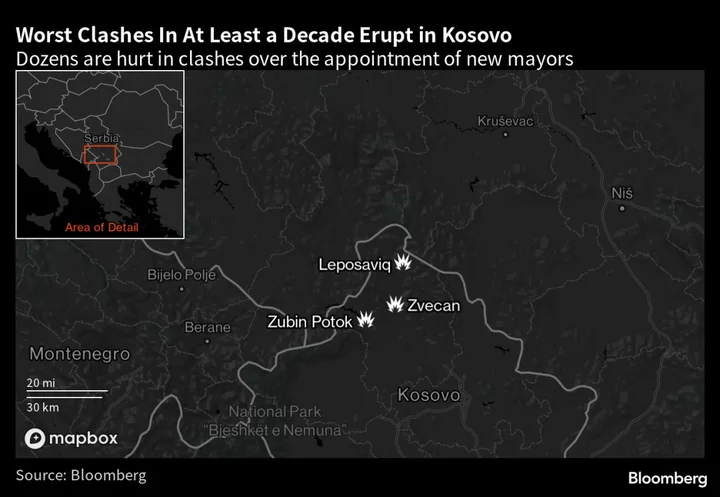Kosovo’s prime minister defied calls from key allies in the US and Europe to dial back a confrontation with Serbia that’s led to the worst violence in a decade, insisting Belgrade make the first move.
Serbia must cut off support for the militia that triggered protests in North Kosovo last month and those responsible must be prosecuted before his government will consider easing its stance, Prime Minister Albin Kurti said in a phone interview.
“We cannot yield as a democratic republic to this violent militia,” he said. “We want things to settle as soon as possible but you know it doesn’t depend only on us.”
Denouncing allied criticism as “unfair,” he made clear his government isn’t backing down despite rising pressure from the US and Europe, on which Kosovo depends for political and economic support. Serbia has denied it instigated the violence but openly supports its ethnic kin in Kosovo.
The unrest, which injured dozens of NATO peacekeepers and protesters, broke out after Kosovo installed mayors in towns in the north following elections that the Serb population there had boycotted. The standoff threatens a new cycle of violence in the country of 1.8 million on Europe’s southern edge as the attention of the continent’s leaders is focused on Russia’s invasion of Ukraine.
Kurti, popular former dissident, said his government would move to reduce the police force it deployed to the region and consider re-running the controversial local elections as sought by its allies in the US and Europe only after Serbia took the first steps. Belgrade has demanded the mayors be removed first.
European leaders have pressured Kurti’s government to soften its line. The US excluded the country’s forces from NATO exercises scheduled for later this year in a sign of frustration.
“It is not okay to bully Kosovo,” he said. “Whenever United States asks something from us, we don’t ask why, but only when and how,” he added, calling the exclusion from the maneuvers “not fair.”
Kurti has sought to cast the conflict as part of the broader standoff between the the US and its allies and Russia, which has close historic ties to Serbia. But his tough line with his sponsors is a gamble for him, since their backing is vital to his quest to gain international recognition.
Serbia has refused to recognize Kosovo’s independence, declared in 2008, and blocked its efforts to join international bodies. Belgrade, which has sought to balance closer ties with Europe with links to Russia and China, encouraged local residents to boycott the local elections.
Initially an outsider to a peace process that has lasted decades, Kurti has survived politically despite crossing important allies in the past. In 2020, he blamed Richard Grenell, a special envoy in Serbia-Kosovo talks under then-President Donald Trump, for backing a no-confidence vote that toppled his government.
Unlike Kosovo’s previous top leaders, Kurti was not a guerrilla fighter. Serving a 15-year terrorism conviction from a Serbian court, he was beaten and forced to be a human shield during the NATO bombing campaign that pushed Serb forces out of Kosovo in 1999.
Freed upon Serbian strongman Slobodan Milosevic’s ouster in 2001, he organized anti-graft protests against the international administrators who oversaw Kosovo’s transition to a fledgling democracy. In 2007, two activists from his ethnic-Albanian party died and dozens were injured in a clash with United Nations police. He himself was arrested and held for nine months.

